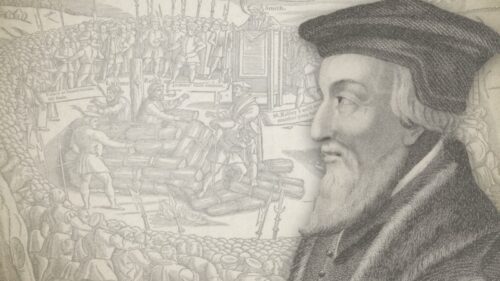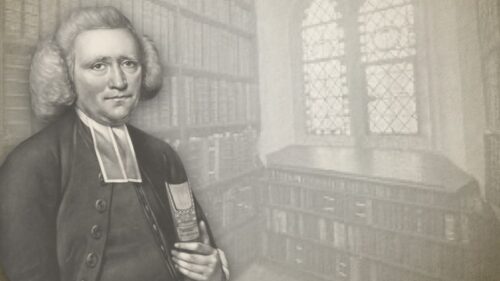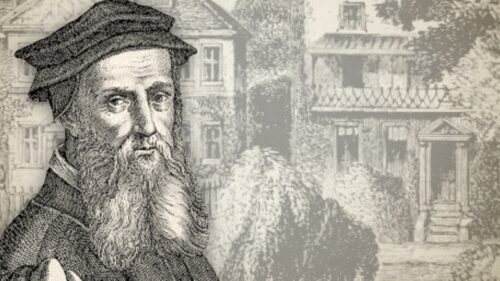-
William Carey: Using God’s Means to Convert the People of India (Part 2)
Part Two: The Mission Prospers The mission at Serampore prospered and spread. Carey was given the most prominent building in the city for the church in which he preached for the next thirty-four years. The town of Serampore, too, prospered as it proved an asylum of peace for fugitives from the Americo-Franco-British wars and it persuaded many wealthy investors to settle there. More missionaries were urgently needed as Brunsdon soon died of a liver complaint. Fountain, who was doing pioneer work at Dinapoor, also died after a short illness. Thomas rejoined the mission but became insane and soon died. The missionaries were able to purchase a very large house in the middle of the town with two acres of garden from the Governor’s nephew for…
-
William Carey: Using God’s Means to Convert the People of India (Part 1)
My reason for publishing this account of William Carey and his Indian mission on my website. On 18-21 February, 2010 a conference will be held at Muscle Shoals, Alabama under the theme ‘The Quagmire of Hyper-Calvinism’. The key speaker will be Dr. Michael Haykin who will lecture on Andrew Fuller as a missionary pioneer. The myth that Andrew Fuller pioneered a missionary movement is superstitiously believed by Dr. Haykin and his circle but the Baptist Missionary Society Fuller helped to found came at the rear end of a long line of Christian missionary organisations whether church based or, like the BMS, a para-church movement. Andrew Fuller was not the instigator of this missionary society but William Carey who urged the Baptists to act as other…
-
John Collet Ryland (1723-1792) And The Restructuring Of Baptist History
A number of modern writers who preach common-grace and duty-faith as redemptive means in evangelisation, view John Collet Ryland as a Hyper-Calvinist. Such a person, a recent BOT article tells us, does not appeal to sinners, “directly encouraging them to trust him (Christ), and appealing to them to do so now.” Obviously, given such criteria, Ryland’s critics know nothing of his extensive gospel ministry or are deliberately introducing a new conception of what ‘directly encouraging sinners’ means. Most of their ‘encouragement’ is found in their slogan ‘God’s provisions and man’s agency’ which stresses the need for man to use all his supposed natural abilities and duties to grasp out and take God’s provisions in Christ. Ryland affirmed that salvation was all of grace. Only then…
-
Cotton Mather Vindicated: A New Look at the Salem Witch Trials
In 1692, New England was in a tumult. Within a matter of weeks no less than 150 suspects had been charged with witchcraft and in the Massachusetts colony frightened men women and children believed that the devil was on the loose. The epicentre of this wave of evil which was to alienate children from their parents, churches from their pastors, servants from their masters and even wives from their husbands was the small community of Salem several hours ride on horseback from Boston. Salem, though of very insignificant size, has received an over-proportioned importance in American ‘popular’ history as an example of how the Puritans strove to purge a town of its sin by burning its evil-doers[1. There were no burnings in Salem. The numerous…
-
Johann Gerhard Oncken: Germany’s Baptist Pioneer
The ‘Enlightenment’ that brought a deluge of immorality The French occupation of Germany under Napoleon’s Dictatorship caused political, social and religious unrest which lasted well into the present century. The Corsican upstart conscripted Germans and compelled them to suppress their fellow-countrymen or forfeit their lives. One man by the name of Oncken, a citizen of Varel in present Schleswig-Holstein, decided to resist the tyrannical French and campaigned to overthrow the occupational forces. Napoleon’s spies, however, were everywhere and Onckenwas compelled to flee to England to carry on his work of liberation in exile. On January 26th, 1800, a son was born to the ex-patriate whom, in God’s providence, he was never to see. The child’s name was Johann Gerhard Oncken. It appears that his mother…
-
John Gill: Preserver and Reformer of the Particular Baptists







